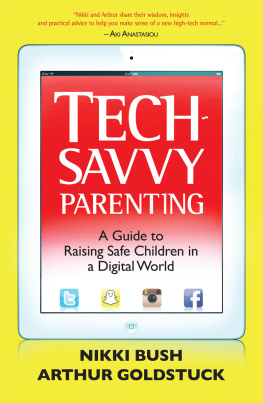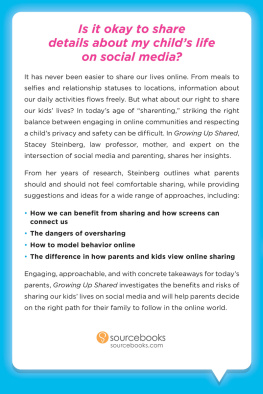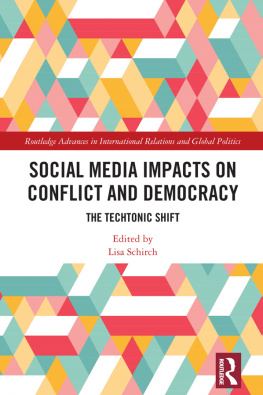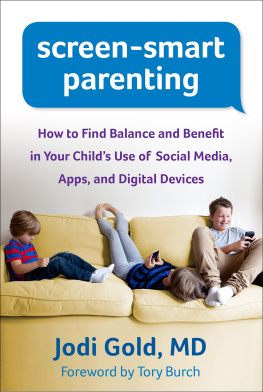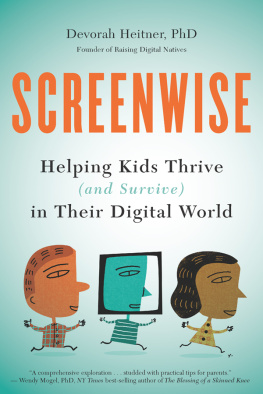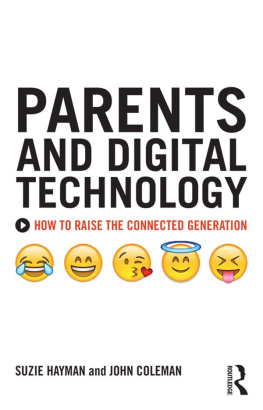Three questions opened this book and prompted my attention and research on TSM, and they were all about my concerns for my children and the lingering impacts TSM would have on their brains, their lives, and their future opportunities. I thought my research would focus on the studies related to mental health, identity, addiction, media studies, personality, and, of course, human development. What I hadnt realized, either in the intentional research work I conducted, or in the incidental research I would engage by living through rapid technological and ecological change, was how empty my questions were once I drilled further into the impacts and implications of the TSM in our lives. I wasnt prepared for the interconnections between space and TSM, the ways in which current community infrastructure issues were related to robber barons of the 1800s, or how the critiques around TSM use in children or by adults were so often harbingers of political and cultural power grabs as much as they might be about informed users.
What was happening in my kitchen, my professional life, my community economy, and my social circles was happening globally, and it was being shaped internal and external to my familiar social and spatial bubbles. I wasnt alone, which certainly is relieving, but neither was I but an incidental blip in a centuries-long battle between industry and government and increasingly between government and government. I thought I was going to learn more to protect myself from hate lists and tighten the parental controls on my kids. The Make Way for Ducklings desire of order, stability, community support, and family endurance seemed to me a proper ending for the research threads examined based on a foundation of human attachment and family support through anticipatory guidance. If enough families understood that the odds are stacked against our control, we might work to better communicate the cultural values and social good we want for our kids. We just gotta connect with our kids more fully, I thought during my beachside conversation with Bens grandparents and my California dinner with Lyon.
A vision of man on the moon and of the promises of an integrated mountaintop spurred a generation toward the conditions that enabled massive explosion of telecommunications innovations, organized Black communities globally against oppression, and made possible global space exploration. The fears of men from the moon ushered in nuclear disarmament and ended the controls of totalitarian regimes across the continent of Europe and Asia as the USSR fell. Today, as the levers of power at my local and national levels lead choruses of constituents against teaching accurate history in our resegregated public schools, there is another turning of the tide. And wealthy men launching space junk are themselves through the largess enabled by their extraction providing the telecommunications resources that are attempting to stop the encroachment of Russia into Ukraine, and beyond. Of course, in the 1960s and 1990s neither the US moon shot or the gift of duck statues could alter the geopolitical machinations within and between nations, but each shifted the paths previously possible.
We are at a moment that cannot be underestimated in terms of its paths and the shifts possible. But it would be unrealistic to think seeing interconnections alone would shift anything. We are equally unrealistic if we believe TSM is about parenting or specific TSM policymaking in our schools or homes. We must appreciate the full picture of the attachment disruptions that occur through TSM, the attachment repair they make possible, and recognize in them both a ray of hope to inspire and instill the kind of actions that could really help repair the ruptures this book describes.
Once I picked at the edges of how hate groups operate, how algorithms were conceived, what impact positive parasocial engagement can have on a brain primed for social cues, and once I realized how value-laden even regulatory opportunities are, it was obvious that even intentional parenting around TSM would have its limits, and that these limits were not so much about malice or bad actors in their own individual dramas, but about the corruption of power dynamics that control the legal and economic frameworks from which our civilization operates. I had not realized that I would be decolonizing technology or applying findings from legal research of critical race theory to help understand the severe limits of parents abilities in supporting their childrens engagement with TSM. And yet, increasingly, the journey led to paths with unexpected starting places, and unacceptable ending trajectories.
Technology has a way of transforming, as the 1967 film The Graduates most famous line, Are you listening? Plastics, implied. The line, said to the soon-to-be college graduate about the industry he should be entering, was a symbol of the disconnect between the confused ambivalence of the youthful character, and the confident, if cryptic, ambitions of his fathers business associate. Today, if that same scene were to play out, we might hear him say, Are you listening? Graphene!, even myself, might be navigating. They are more about, or maybe they are also about, the developmental moment of my family, my workplace, my community, and our broader globe.
Just as human growth and development has predictable periods of growth, regression, consolidation, and adaptation, the growth of human systems does as well. Technology is a human system, and technologys touchpoints also have predictable periods of growth, regression, consolidation, and adaptation. The cycle of technology innovation has a disruptive impact on human growth and development, and while humans may gain a capital good through its development, their own development is altered by its introduction and adoption. Therefore, we must attend to the development cycles of humans, our technology, and our ecology by appreciating the bioethical imperative. Bioethics is the study of the effects of advances in biology, medicine, and technologies, and it rests on four key principles: non-malfeasance, beneficence, justice, and autonomy. It is both a timeless field, in that humans often seek these values in their respective eras, and very young, about fifty years or so. As with any ethics, there is debate about the comprehensiveness of these principles.
A bioethical approach to the relationship between humans and our technology would consider the obligations human creators and human systems have to individual humans and to humanity. A chemist who actively understood the toxicity of a substance and then worked tirelessly to place the substance into every child and workers body would rightfully be called evil once their knowledge or and commitment to harm was revealed. Bioethics of technology development would consider that development is not agnostic or without cultural or historic precedent; that technology development leads to change and that change disproportionately impacts those with least power and access. A technology bioethics would consider what is possible, what is meaningful, and what is leverageable between what one market wants and another community needs.
Yet its hard to know how such a responsive set of solutions could be created in a world where individual corporate actors can ignite a new technology on the backs of existing infrastructure, especially when such efforts are enabled to actively derail existing public good efforts. Never-mind imagining how such a process would unfold while sustaining our ecosystem and by releasing a multinational corporate hold on people and places. In some ways we see how it might be possible in films such as Coded Bias, and yet even as that film led to changes in public opinion, there were specific experts located within technology companies whose work to fix the problems of algorithmic bias was simultaneously squelched as they were forced out of the companies building these technologies. Is the public groundswell enough to bring forth technologies informed by bioethics? In my interview with SAFE lab director Dr. Desmond Patton, he sees the conversations having matured in the aftermath of George Floyds killing and the protests against anti-blackness that followed. He shares that:


